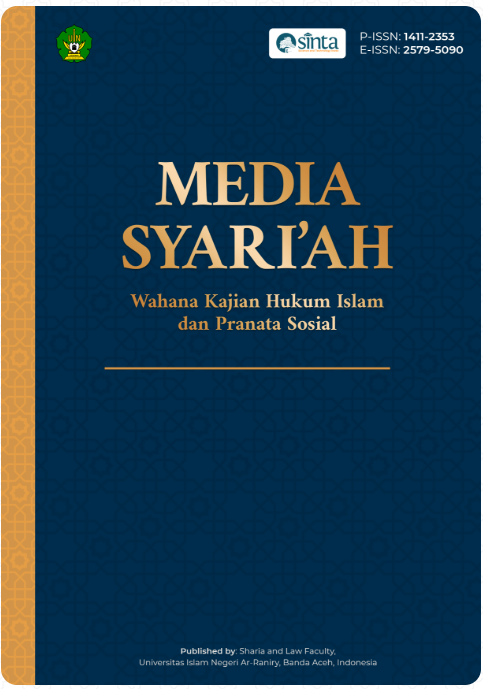Dayak Ngaju Customary Law's Criminal Sanctions Agains Adultery in Palangka Raya
DOI:
https://doi.org/10.22373/jms.v26i1.19603Keywords:
Sanctions, Customary Crimes, Dayak Ngaju, Adultery, Jekan Raya DamAbstract
The law in each society has its own style and nature. Customary law is a law that always grows from a real need for life and a way of life in society, which is the whole culture of the community where customary law applies. Customary law if violated will certainly be subject to sanctions. Customary law in Palangka Raya against perpetrators of adultery will be punished in the form of sanctions, namely by paying a singer or jipen fine to complete peace according to Dayak Ngaju custom. Based on the facts in the field, if a criminal act of adultery is committed by a wife with an unmarried man against her husband, it certainly raises questions about Damang's authority as Dayak Traditional Chairman so that it can be known and understood that what are the legal acts in the settlement of adultery committed by the perpetrator.
References
Abdullah, B., & Saebani, B. A. (2013). Perkawinan dan perceraian keluarga muslim. Bandung: Pustaka Setia.
Achmad Ali, S. H., & Wiwie Haryani, S. H. (2014). Sosiologi hukum: kajian empiris terhadap pengadilan. Kencana.
Ali, A. (1984). Hukum Waris, Keluarga dan Pembuktian. PT. Bina Aksara, Jakarta.
Aziz, M. A. (2013). Denda Cerai Dalam Perjanjian Perkawinan Adat Dayak Ngaju Di Kalimantan Tengah Sebagai Upaya Mempersukar Perceraian Ditinjau Dari Undang-Undang Nomor 1 Tahun 1974 Tentang Perkawinan.
Fatnan, A. (2020). Analisis putusan hakim atas nusyuz istri akibat membayar denda adat dalam perkara cerai talak perspektif fiqh Mazhab Syafi’i: Studi perkara nomor 0121/Pdt. G/2014/PA. Sgu. Universitas Islam Negeri Maulana Malik Ibrahim.
Hadikusuma, H. (2005). Bahasa Hukum Indonesia, PT. Alumni, Bandung.
Haq, H. S. (2020). Mediasi komunitas sebagai alternatif penyelesaian sengketa. Penerbit Lakeisha.
Hidakusuma, H. (2003). Hukum Perkawinan Adat dengan Adat Istiadat dan Upacara Adatnya. Bandung: PT. Citra Aditya Bakti.
Hilman, H. (2007). Hukum Perkawinan Indonesia Menurut Perundangan, Hukum Adat, Hukum Agama. Bandung: Sumbersari Indah.
Jayanti, F. A., Kosasih, J. I., & Widia, I. K. (2021). Legal Protection of Contract Workers in the Work Agreement in Jayagiri Hotel. Jurnal Hukum Prasada, 8(2), 78–88.
Kuzari, A. (1995). Nikah Sebagai Perikatan. RajaGrafindo Persada.
Maulana, R. (2018). penyelesaian perkara perceraian masyarakat Dayak melalui lembaga kedamangan di kota palangka raya.
Muhaimin, M., Husni, L., & PS, L. W. (2021). Permasalahan Hukum Pengawasan Otoritas Jasa Keuangan Dalam Konversi Bank Ntb Syariah. Prosiding SAINTEK, 3, 387–397.
Muhammad, A. K. (2006). Etika Profesi Hukum, Bandung: PT. Citra Aditya Bakti, Cetakan Ke III.
Prodjohamidjojo, M. (2011). Indonesia Legal Center Publishing. Jakarta Selatan.
Saleh, K. W. (1981). Hukum Acara Perdata RBg/HIR, Jakarta. Ghalia Indonesia.
Setyowati, F. M. (2005). Etnobotani masyarakat dayak ngaju di daerah timpah kalimantan tengah. Jurnal Teknologi Lingkungan, 6(3).
Soekanto, S. (1992). Intisari Hukum Keluarga, Bandung: PT. Citra AdityaBakti.
Subekti, S. H. (1978). Pokok pokok hukum perdata. (No Title).
Suratman, D. (2014). Metode penelitian hukum. (No Title).
Thoyib, T. (2018). Eksistensi perjanjian perkawinan adat Dayak ngaju dalam mencegah perceraian pasca putusan Pengadilan Agama Palangka Raya. IAIN Palangka Raya.
Downloads
Published
Issue
Section
License
MEDIA SYARI'AH: Wahana Kajian Hukum Islam dan Pranata Sosial has CC-BY-SA or an equivalent license as the optimal license for the publication, distribution, use, and reuse of scholarly work. Authors who publish with this journal agree to the following terms:
1. Authors retain copyright and grant the journal right of first publication with the work simultaneously licensed under a Creative Commons Attribution-ShareAlike 4.0 International License that allows others to share the work with an acknowledgment of the work's authorship and initial publication in this journal.
2. Authors are able to enter into separate, additional contractual arrangements for the non-exclusive distribution of the journal's published version of the work (e.g., post it to an institutional repository or publish it in a book), with an acknowledgment of its initial publication in this journal.
3. Authors are permitted and encouraged to post their work online (e.g., in institutional repositories or on their website) prior to and during the submission process, as it can lead to productive exchanges, as well as earlier and greater citation of published work (See The Effect of Open Access).
You are free to:
Share — copy and redistribute the material in any medium or format.
Adapt — remix, transform, and build upon the material for any purpose, even commercially.
The licensor cannot revoke these freedoms as long as you follow the license terms.
All papers published in MEDIA SYARI'AH: Wahana Kajian Hukum Islam dan Pranata Sosial are licensed under a Creative Commons Attribution-ShareAlike 4.0 International License.




.png)


.png)
.png)
.png)



